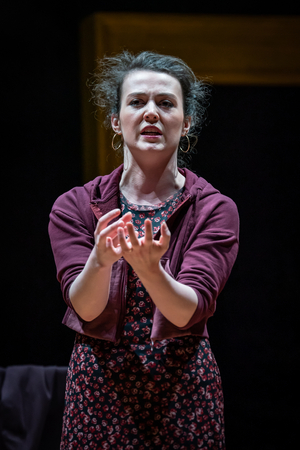Review Roundup: The Critics Weigh in on Modernized NORA: A DOLL'S HOUSE

Nora is the perfect wife and mother. She is dutiful, beautiful and everything is always in its right place. But when a secret from her past comes back to haunt her, her life rapidly unravels. Over the course of three days, Nora must fight to protect herself and her family or risk losing everything. Nora: A Doll's House is now playing at the Young Vic (66 The Cut).
Ibsen's brutal portrayal of womanhood caused outrage when it was first performed in 1879. Originally produced by the Citizens Theatre in Glasgow, this bold new production by Stef Smith, one of Scotland's most exciting playwrights, reframes the drama in three different time periods. The fight for women's suffrage, the swinging sixties and modern day intertwine in this urgent, poetic play that asks how far have we really come in the past 100 years?
The complete cast includes Mark Arends, Natalie Klamar, Luke Norris, Amaka Okafor, Anna Russell-Martin and Zephryn Taitte.
Let's see what the critics had to say...
Charlie Wilks, BroadwayWorld: We see Great Performances, but even that isn't enough to make us want to sit and listen. If you're familiar with Ibsen's original, then this reimagining - regardless of its new twist - doesn't feel more exciting than the original.
Nick Curtis, Evening Standard: The mix of fine-grained detail and thumping obviousness persists throughout. Tom Piper's set gives us three doors and three overlapping floors and ceilings. When Luke Norris as the husband is about to rape Nora in 1968, the shock is heightened by the recoil of the other two women. By contrast, the ending is so grossly distended it feels like we're living through Nora's dramatic final epiphany three times, like Groundhog Day.
Fiona Mountford, Telegraph: Ibsen's proto-feminist masterpiece has never been less than pertinent since its 1879 premiere and has had particularly fresh revelations to shine over London theatre of late. Last autumn, the Lyric Hammersmith presented an adaptation set during British rule in India; an Indian Nora was thus intriguingly ensnared in a double bind of sexual and racial inferiority. Now this self-declared "radical new version" from Stef Smith, first seen at the Citizens Theatre in Glasgow, offers three different Noras at three points spanning a century, in 1918, 1968 and 2018.
Clive Davis, The Times: What is there to add to Ibsen's groundbreaking drama about a wife who suddenly rebels against bourgeois convention? Stef Smith's "radical" version of A Doll's House ties itself in knots by trying to transplant the central character to three different periods, with three women playing the same role. An ambitious idea, to be sure, but one that in the end only sows confusion, leaving the audience stumbling through a hall of mirrors.
Jonathan Marshall, Londonist: The piece is bursting with imagery, relying on the actors to do most of the work. The three Noras move in synch, mirroring gestures and speaking in chorus. Completing one another's sentences, the writing is rhythmic and often poetic. The climax works wonderfully as Smith utilises her 2018 Nora to poignantly deliver the stark truth that although progress has been made, there's still a long way to go. Ibsen's spirit is very much still alive here, but there is also another exciting voice in the room.
Natasha Tripney, The Stage: While the play eloquently demonstrates that Nora's story does not end when she steps through the door(s) - open rather than closed in Tom Piper's set design - the coda feels heavy-handed, overstating a case the play has already made. What it does best is illustrate how change does not move in a straight line, nor benefit everyone.
Heather Neill, The Arts Desk: Translation can spell liberation. Where Victorian English might be distancing, a new version of a play originally written in another language immediately benefits from the immediacy of familiar speech. Stef Smith began as a poet and her enjoyment of language in different registers, with a hint at period changes, is one of the pleasures of this piece. Here there are three Noras at three stages of liberation: 1918 when (some) women earned the right to vote; 1968 just after the legalisation of abortion and when the contraceptive pill was coming into general use; and 2018 as the #MeToo movement gathered momentum.
Connor Campbell, The Upcoming: Nora: A Doll's House hints at an entirely modern take, looking at how the erosion of the welfare state, the shutting down of women's shelters and the continued prejudices of the workplace prevent women from being easily able to leave abusive, unhappy homes. Instead, that narrative is wasted on a distracting wider gimmick.
Photo Credit: Marc Brenner
Reader Reviews



